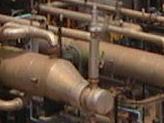This course is accredited by the Institution of Chemical Engineers (IChemE).
Networks. Some are efficient, some are not. Is your heat exchanger network the most efficient it could be?  Just like some highway networks are more efficient than others, some heat exchanger networks can be more efficient than others. HOW DO YOU KNOW YOUR HEAT EXCHANGER NETWORK IS NOT COSTING YOU MONEY? And in this age of transparency, HOW CAN YOU DEMONSTRATE THAT IT IS NOT COSTING YOU MONEY? As the world continues to embrace the need to reduce carbon emissions, the interest in energy efficiency will continue to remain high. And when the price of energy starts to rise again (which it will), the cost of an inefficient heat exchanger network may be critical to your success. Please note – we are not talking about individual heat exchangers, but the entire network. We have taken our years of experience (in both heat integration and training) and developed two practical and informative 1-day training courses to help you
Just like some highway networks are more efficient than others, some heat exchanger networks can be more efficient than others. HOW DO YOU KNOW YOUR HEAT EXCHANGER NETWORK IS NOT COSTING YOU MONEY? And in this age of transparency, HOW CAN YOU DEMONSTRATE THAT IT IS NOT COSTING YOU MONEY? As the world continues to embrace the need to reduce carbon emissions, the interest in energy efficiency will continue to remain high. And when the price of energy starts to rise again (which it will), the cost of an inefficient heat exchanger network may be critical to your success. Please note – we are not talking about individual heat exchangers, but the entire network. We have taken our years of experience (in both heat integration and training) and developed two practical and informative 1-day training courses to help you
- Basic Heat Integration
- We begin by looking at a PFD and asking a very simple question … is the heat exchanger network optimised?
- We spend the day building the fundamentals of heat integration, defining the 100% efficiency condition for a process, introducing the concept of the “thermal pinch”, selecting streams for exchangers, and discussing how to control the network.
- Intermediate Heat Integration
- We discuss the impact of multiple utilities, discuss how to manage difficult streams, mixing, and targeting areas and parameters in your process that are candidates for being “unfrozen” to maximise value. Finally, we discuss how to apply the techniques to retrofit situations.
The courses use a mix of classroom lecture and hands-on problem solving to reinforce the principles. The courses are intended for practicing chemical, process, or environmental engineers involved with the design or operation of an energy intensive resource processing, minerals processing, manufacturing process, or an electricity generator. What you will gain
- A thorough understanding of the Heat Pinch Analysis and the concept of Energy Targeting
- The ability to predict the energy requirements for a specific process prior to design or simulation
- The ability to design the heat exchange network for a process which meets the energy requirements predicted
- An understanding of the interaction between energy costs and the capital costs associated with Heat Recovery
- The ability to identify value adding changes in the process with minimum effort
Contact us for more information